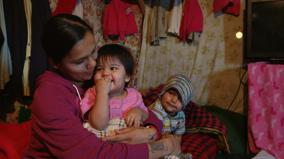Where I'm From
This feature documentary represents a quest that is both personal and universal. Director Claude Demers (Barbers: A Men’s Story, Ladies in Blue) revisits the working-class neighbourhood of Verdun where he grew up and asks questions about the mysteries of his origins and his formative years, which were marked by abandonment. Bastien and Cédric, two young boys who are discovering the world around them, serve as the narrator’s alter egos. Between past and present, birth and death, Where I'm From traces the course of one man's redemption. The film marries realism with lyricism and a vibrant soundtrack that celebrates life.

Details
-
participationCédric JoyalBastien-Xavier Landry-MironJanie-Luc Beauchamp-FrancoeurGaby BrunoKarl FontaineEsther HagemanHopeton MorrisBenoit PoirierSerge PoirierPavel Pugachev
-
writerClaude Demers
-
directorClaude Demers
-
director of photographyJean-Pierre St-LouisNicolas Canniccioni
-
editingAlexandre Leblanc
-
sound recordingSylvain Vary
-
sound editingClaude Beaugrand
-
additional cameraClaude DemersAlexandre Leblanc
-
additional sound recordingMarcel ChouinardMélanie GauthierRichard LavoieOlivier LégerSimon Plouffe
-
researchClaude Demers
-
research assistantDoris LapierreIsabelle Potvin
-
production assistantAgnès FalquetMarie-Ève GrignonÉtienne HansezIan JaquierFrance LareauIsabel MohnShane Smith
-
editing advisorMichel Giroux
-
editing assistantAriane Pétel-Despots
-
dialogue editingFrancine Poirier
-
additional sound editingFrançois Senneville
-
aerial photographyClaude DuchaînePaul Hurteau
-
car gripBertrand Dupuis
-
technical coordinator - shooting equipmentSteve Hallé
-
technical support - editingPierre DupontIsabelle PainchaudPatrick Trahan
-
translationVision Globale
-
titlesGaspard Gaudreau
-
infographicsMélanie Bouchard
-
online editingDenis Gathelier
-
narrationClaude Demers
-
narration recordingGeoffrey Mitchell
-
foleyLise Wedlock
-
re-recordingSerge Boivin
-
original musicAlexandre CorbeilGabriel Dharmoo
-
musicianAlexandre CorbeilGabriel Dharmoo
-
music recordingJean-François Blouin
-
marketing managerFrançois Jacques
-
marketing manager - assistanceCatherine BenoîtGeneviève Bérard
-
administratorSia KoukoulasJohanne Dubuc
-
production coordinatorHélène Regimbal
-
administrative assistantPerrine BralSophie DupuisLise Lévesque
-
technical coordinatorRichard Cliche
-
associate producerMélanie Lasnier
-
producerColette Loumède
Education
Ideal for projects on social studies and memoir writing. What is the filmmaker trying to say about his past and our relationship to the past? Discuss the value of education in and outside of the classroom. Write a poem/memoir about your past and your favourite places growing up. What do you want to remember? What won’t you forget? Interview your parents or grandparents about how things have changed where they live and what traditions have been lost.

















